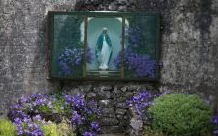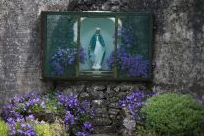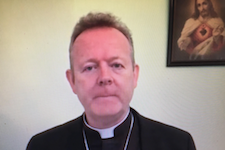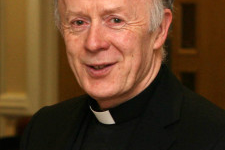Irish bishops express sorrow, shame and regret at report on Mother and Baby Homes

Tuam memorial - Image ICMO
Source: Irish Catholic Media Office
Catholic Bishops from across Ireland have issued statements on the Report of the Commission of Investigation into Mother and Baby Homes which was published earlier this week. The 2,865 page study on the homes for unmarried mothers and their children, run largely by the State and the Catholic Church, (one was also run by the Church of Ireland) throughout most of the 20th century, with the complicity of wider society, chronicles deprivation, cruelty and some cases shocking levels of infant mortality.
Archbishop-elect of Dublin Dermot Farrell
I welcome the publication of the report into the Mother and Baby Homes. This report, and those like it, which explore our painful past make for extremely disturbing reading. They reveal deep wounds, and bring to light the profound injustices perpetrated against the vulnerable in our society over a long period of time - against women and children whose lives were regarded as less important than the lives of others. The silence which surrounded this shameful time in the history of our land had long needed to be shattered. The pain of those who were hidden away must be heard; those once largely without a voice now can speak clearly to our world, and we need to listen, even when what we hear pierces to the heart.
I welcome, therefore, the actions of our Government and of the Commission that has made this possible. These voices must be heard, but hearing, while important, is not enough. The grievous failures of our past have been laid bare. A genuine response is required: ours - as a Church and a society - can only be a full apology, without any reservation. There should never have been a time for avoidance and facile solutions. This country, the Church, our communities and families are better places when the light of truth and healing are welcomed. May the Lord's compassion be the touchstone of our response. May the light of Christ bring healing to all.
Bishop Paul Dempsey, Bishop of Achonry
I am conscious as I write these words that I have no idea, nor can I even imagine what it must have been like for a young girl in Ireland to have become pregnant outside of marriage just a few decades ago. So many were abandoned by their families, their communities, their parishes, their priests, their Church, and the men who were responsible for their pregnancy. The loneliness, the shame, the fear, the angst, the sheer terror is beyond my comprehension. The Commission of Investigation into Mother and Baby Homes Report goes to three thousand pages. It would be impossible for me to cover all the issues it raises. However, the general tenor that emerges within its pages is of a society that was cold and uncaring. We could all too easily blame "society," but as a member of the Church, and a leader in that Church, I face the difficult reality that it was a society which was deeply influenced by the Catholic Church.
In their apology, the Bon Secours Sisters, who ran the Tuam Mother and Baby Home, stated that they "did not live up to their Christianity." It seems that so many during that period of Irish life "did not live up to their Christianity," even though we were a nation that prided ourselves on being a good Catholic country. It seems that we may have been good Catholics, but we were not such good Christians. The question has been asked: "How could this happen?" How could we be so cold, so cruel to our daughters, our sisters, our friends, our neighbours? One explanation was that the Church had a distorted view of sexuality that seemed obsessive. Instead of seeing sexuality as a beautiful, sacred gift, created by a loving God, it was considered something secretive and taboo, something not to be talked about. Anyone, who through human nature, was viewed to have made a mistake, was shunned. Sins of a sexual nature seemed to be the only sins one could commit, there was little focus on other immoral issues such as domestic abuse or fraud. There is no doubt, and it is truly shameful, that the Church during this time lost its focus, which should always be Christ. When the Church fails to focus on Christ, all sorts of distorted practices emerge. It seems that one of those distorted practices was exercising an unhealthy power over people's lives, especially in the most intimate areas of life.
Unfortunately, we cannot change the past, but we can learn from it. This, perhaps, is where we can draw some hope. The Tánaiste, Leo Varadkar, stated that; "we should not lose sight of the more hopeful story that is told in the Commission's report as well. It tells the story of a country that has changed and progressed, that got better, kinder and more compassionate, more loving, less judgmental and less misogynistic as the years passed." I believe this is generally true, but in my own ministry over the years, I have come across many people who lament the direction our country has taken. They feel it has become far more secular, with fewer numbers attending Mass and they believe there is an agenda to rid society of the influence of the Church. In the light of the Mother and Baby Homes report and the numerous reports that preceded it, is it any wonder people would want to rid the country of the Church that is portrayed? I believe there is a more hopeful message in there for the Church too. The publication of so many painful reports has exposed us to the truth. Jesus Christ tells us; "The truth will set you free" (Jn. 8:32). It is important to acknowledge that it was the "secular" world that has called the Church to account and made us face the truth. Surely this is a good thing and God has to be at work in it?
In my experience the Church has become a more humble, more compassionate community today. It no longer holds an unhealthy, powerful grasp on society. The Church has its teaching, a teaching that is inspired and revealed by Christ, an ideal that followers of Christ aspire to but do not always attain. It is a teaching that is proposed, not imposed. It is also important to state that so many people in parishes, priests, sisters, members of parish pastoral councils, and numerous others reach out and serve the needs of so many in such generous ways in communities right across the country today. Their work is critical to the lives of so many people and is to be commended. Our position as Church was never to be at the centre of society in, as Pope Francis puts it, a "self-reverential" manner. I believe this is a moment of fundamental call and challenge to those of us who hold the Church close to our hearts. There are justifiable concerns and fears about the future, but we must remember that the Church is not dying, it is a model of Church that is dying. The dying process is painful, but the potential for new life always gives hope. This is Christ's Church, not ours, he is in charge, "we are ministers, not messiahs" as St. Oscar Romero reminds us.
It is hugely positive that the real-life stories, the experience, and the pain of so many has now been heard through this report. The State has apologised, as have religious orders who were responsible. I too, as a Church leader, wish to apologise to all those who were treated in such an undignified and demeaning manner. However, as has been said many times, apologies can be easy, action is more challenging. I hope and pray that those who wish to find their true identity that might bring the peace they are searching for, can be given the means to do so.
As I conclude, there is one concern I wish to raise. I heard several politicians making statements this week about our past and how the poor treatment of women and children must never happen again. Related to this, over the past few years when I worked in parish, I was in regular contact with people in a Direct Provision Centre. I saw how women and children and others, were cramped into tight living spaces, lacking basic human dignity. I have been thinking about them these days. As we have been told, we cannot change the past, but we can change the present. I urge those in power, in the light of the Mother and Baby Homes Report, to focus on improving the living conditions of those in our Direct Provision Centres. I would imagine this real action to improve the lives of mothers and children today, would be a fitting tribute to those who suffered in Mother and Baby Homes in the past.
Archbishop Michael Neary - Archbishop of Tuam
I welcome the publication by the Minister for Children of the Report of the Commission of Investigation into Mother and Baby Homes. The Report contents are a cause for shame as we are confronted in our very recent history with the scandalous way in which vulnerable women and children in our society were deprived of care and dignity and subjected to humiliation.
The Church of Jesus Christ was intended to bring hope and healing, yet it brought harm and hurt for many of these women and children. Many were left broken, betrayed and disillusioned. For them, and all of us, these revelations seriously tarnished the image of the Church. The delight and joy which we associate with the birth of a new baby instead became clouded with darkness and gloom. This was a time when single pregnant women and their children were labelled as "unmarried mothers" and "illegitimate", and then judged, stigmatised, and ostracised by their own families, by their communities, and the Church. These attitudes were wrong and very sad. The Church failed in its responsibility to love and cherish those who were thus diminished. What this Report makes clear to me is that when the Church is not serving with compassion, it is failing. For that I am genuinely sorry. As a Church leader I apologise unreservedly.
The Tuam Children's Home was owned by Galway County Council and operated by the Bon Secours Sisters. The Council, on behalf of the State, was responsible for the residents. While the diocese never had an administration role in the running of the Home, it had a pastoral one, in that the priests of Tuam parish served as chaplains.
While everything in the Diocesan Archives relating to the Home has been shared with the Commission, the archive does not hold any information relating to the Home's living conditions. Nor does it give us any insight into the helplessness and suffering of these mothers who were separated from their babies either by death or adoption. Today, how can we even begin to comprehend the raw pain and psychological damage of family separation and its devastating consequences on loving mothers and on the emotional development of their children? Must we ask as to the whereabouts of the fathers? Had the Church been more forthright in acknowledging the responsibility of the men who fathered these children, the outcome for many young mothers and their children would have been very different indeed.
Through the Commission's Interim Statement in March 2017, I was horrified to learn that they discovered many human remains at the Tuam site, which, on analysis, matched the time scale of the operation of the Home. These discoveries underline the enormous suffering and pain for the little ones and their mothers.
Furthermore, the disparity which continues to exist between the Register of Deaths, and the absence of burial location records, is a critical aspect of this sad story which remains un-reconciled. This disparity is a matter of great public concern. The burial pattern in the Home in Tuam, more than any other single occurrence, has, understandably, caused the most outrage. While the Report makes for difficult reading, every step towards uncovering the complete truth regarding the burial pattern is welcome. In this way, as a society, we can take appropriate steps to heal the wounds caused, and we will be enabled to move forward together.
The Commission's Report provides expert insight into many shameful aspects of our social history. It focuses on the State's culture and its inter-relationships with local authorities, Church, families and individuals. I wish to pay tribute to Judge Yvonne Murphy and her team for the critical and detailed work undertaken. I would like to acknowledge the work carried out by Catherine Corless for her investigative work which has afforded dignity, justice and truth to the deceased and their families. I also wish to acknowledge the contributions of the former residents, and all who cooperated with the Commission. A continuation of this multifaceted analysis - however challenging - will assist the maturing of our society, prevent such atrocities from ever happening again, and thereby go some way in serving the common good.
Again, I acknowledge and humbly ask forgiveness for the abject failure of the Church for the pain and suffering visited on those women and their children in the Mother and Baby Homes nationally.
Bishop Fintan Gavin, Bishop of Cork & Ross
I welcome the publication of the report of the Mother and Baby Homes Commission of Investigation.
The report describes a very sad chapter in our Irish History. Through a culture of fear, judgement and secrecy, women who were pregnant felt isolated and abandoned and had nowhere to turn but to these institutions. As I read the courageous testimonies of the women and their now adult children who have shared their story with the Commission, I feel a sense of shame and embarrassment for how as a Church and a society we failed so often to respond compassionately to their needs. My first thoughts today are with all those women who were resident in mother and baby homes and with their children.
As Bishop I want to acknowledge the part played by the Church in contributing to this culture of judgement and secrecy which at times showed so little compassion or respect for the women and their babies. They were treated as second-class citizens.
I believe that it is only in acknowledging the truth of this reality and the hurt and pain experienced that we can begin the journey of healing. I thank Judge Yvonne Murphy and the Commission staff for this clear and comprehensive report. They have done a great service to society and to the Church in helping us to know the truth about our past.
As the former residents and their children try and piece together their personal history, I am aware that some of that information is contained in church baptism records. I appeal to our legislators to find ways so that birth and baptism record information can be legally shared with compassion and sensitivity with those to whom it rightly belongs - while taking into account the complexities and challenges involved.
Today I am reminded of the powerful words of Pope Francis in the Phoenix Park on his visit to Ireland in 2018. I, too, want to say sorry and ask forgiveness:
"We ask forgiveness for the children who were taken away from their moms and for all those times when many single mothers were told that to seek their children who had been separated from them - and the same was told to their daughters and sons who were looking for their mothers - that this was a mortal sin. This is not a mortal sin but the Fourth Commandment! We ask forgiveness. May the Lord, sustain and increase this state of shame and repentance and give us the strength to commit ourselves so that these things never happen again and justice may be done. Amen."
I pray for healing in the hearts, minds and spirits of all whose lives were tarnished and for everyone whose heart is aching as we encounter the truth of our past. With Pope Francis who wrote this prayer in his 2020 letter entitled We are Brothers and Sisters, I pray:
"Grant that we Christians may live the Gospel, discovering Christ in each human being,
recognizing him crucified in the sufferings of the abandoned and forgotten of our world,
and risen in each brother or sister who makes a new start."
Bishop Fintan Monahan, Bishop of Killaloe
I welcome the publication of the Report of the Commission of Investigation into Mother and Baby Homes. I hope that the report will be of some help to the survivors of the many institutions involved and, that in revealing the truth, it will begin a process of healing. Many thanks to all who contributed to the significant work of the Commission, those who facilitated the process, and all who participated in the process.
Having read the report, my response is one of sorrow, sadness, shame and deep regret. It will take some time to process and reflect on its entirety and all of its implications.
Killaloe Involvement
There were two Mother and Baby Homes in the Diocese of Killaloe: Sean Ross Abbey in Roscrea (1931-1969) and another home in Kilrush. The County Clare Nursery (1922-1932). Both came under the scrutiny of the Report and are not exempt from severe criticism in the findings of the Report.
The Report
The Report gives an opportunity to listen, first-hand to the experience and stories of the many survivors and reflect with them on the painful memories that are so real. It is clear that in the recent past many single mothers and their children were treated unfairly, unjustly and harshly in those Homes. The pain, described so often in the report of a mother being separated from her home, family and baby is unimaginable.
I am aware that mothers and their children have carried a legacy of pain from their experience in these homes. So many have struggled to have a sense of identity as a result of that experience. I would like to think that this Report will go some way to giving them the recognition they so rightly feel is their due. I say to them: "You are our sisters and brothers and you were let down by the Church and State ."
Apology
As bishop of Killaloe, I humbly say sorry to all who suffered as outlined in the Report. For the degradation caused, I am sorry; for the suffering inflicted, I am sorry; for the failure of the Church to demonstrate its commitment to the sacredness of human life, I am truly sorry.
Sorry is a small word that may seem inadequate in the light of all that it is attempting to address. I can only say that it comes from my heart.
A Judgmental Church
It is clear that, in the recent past, single mothers and their children were treated unfairly, unjustly and harshly by the Catholic Church that was supposed to be merciful, compassionate and caring. This mistreatment arose to a great extent from a strict moral code that mostly was imposed very one-sidedly. Single mothers and their children bore the brunt of that one-sided approach and they suffered greatly as a result.
Mother and Baby Homes
Until very recent times, Mother and Baby Homes were wrongly seen as a necessary means of dealing with what was considered a problem in the eyes of a patriarchal Church and Society. Unfortunately, this judgmental climate led to these Homes being unhappy places where, as the Report states, "various cruel treatments were meted out to mothers". I know that mothers and their children have carried a legacy of pain from their experience in these Homes.
A Plea for Forgiveness
As Church, in the true Christian tradition of repentance, we acknowledge our wrongdoing, accept it and ask for forgiveness.
It is a bitter irony and cause of great shame that a Church, which valued the sacredness of all human life and saw all its members as equal in God's eyes, failed to show an equal love to all the children of God's Family - single mothers and their children.
Equally, the single mother did not receive the compassion and love that the Church professed to show all people. We now clearly see that single mothers should not have been treated in such a manner. I accept that the Church which judged them so harshly is shamed by its actions. That shame is a legacy handed down to our Church today.
My hope is that we, as Church and society, have learnt much from the hard lessons of the past in relation to safeguarding and the Mother and Baby Home Report. As a consequence of the enormity of this sadness and suffering it will make the Church and society of our day a better, safer place. I would hope that our Church as a result of this will be more open to listening to the voices of women and men, but particularly women. A Church that will be more inclusive, to make it a more truly Christian environment for all to live and thrive, especially the most vulnerable in our communities. As an outcome of this report, I commit to ongoing dialogue with and working alongside survivors to achieve justice and healing.
If anyone affected by any issues arising from the report would like to meet with myself or any Church personnel you are welcome to make contact through the diocesan office in Ennis. Counselling and support details from the Commission website are available below.
LINKS
Counselling Service for Former Residents of Mother and Baby Homes.
The National Counselling Service (NCS) was asked to provide counselling to former residents through its counselling locations. The HSE's NCS has 20 years of experience in providing counselling and psychotherapy to a wide range of clients including those who have experienced psychological difficulties due to time spent in institutions. Counselling is available face to face, by telephone or online through secure video. This service is available to adults living in Ireland if you are a former resident of Mother and Baby Homes (mothers or children).
Access to the National Counselling Service for former residents may be made by direct self-referral. You can do this by referring yourself to the service that is nearest to you. We will also accept written referrals from health care professionals such as GPs.
Individuals referred will be offered an initial assessment appointment. This to establish if the NCS is the appropriate service to meet a person's needs at this time.
If counselling is appropriate the next available counselling place will be offered. When making a referral to the NCS it would be helpful to identify if you are a former resident of a mother and baby home.
This will ensure you are prioritised for the next available counselling place. You can find out about your nearest counselling service by contacting the HSE region which looks after your county.
See full list of contact details here: www.hse.ie/eng/services/list/4/mental-health-services/national-counselling-service/contact-us/ Outside of office hours Anonymous telephone support is available from Connect Counselling, https://connectcounselling.ie a HSE funded service. Freephone 1800 477 477 from 6pm to 10pm every day (7 days a week).
Other Support Options: yourmentalhealth.ie www2.hse.ie/mental-health/ for more mental health support options including phone, text and online
...
Read the Executive Summary of Commission into Mother & Baby Homes here: www.gov.ie/en/publication/22c0e-executive-summary-of-the-final-report-of-the-commission-of-investigation-into-mother-and-baby-homes/


















